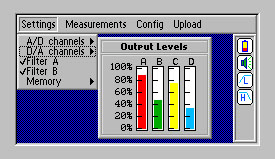LT7680 TFT display driver library
The LT7680, LT7680A_R, and LT7680B-R display controllers are supported by the RAMTEX S6D0129 display driver library package.
Full GUI display driver C source code. Processor and C compiler independent.
More info about Graphic RGB Color library (S6D0129 family)
LT7680 display controller characteristics
Below is a brief introduction to the main characteristics for the LT7680 RGB display controller (seen from a software driver design viewpoint).
For information about the LT7680 driver software support please go to the library description.
LT7680 device type
- COG RGB color display controller for use in small embedded systems with on-chip frame buffer and TFT screen driver.
- The LT7680 supports TFT screens with a size up to 1280 x 1024 pixels (WxH)
- On-chip TFT driver with voltage generator
Frame buffer
- RGB pixel resolution (bits per pixel): 8-bit, 16-bit, 24 bit.
- LT7680 frame buffer organization: 1280 RGB pixels on scan line, 1024 lines.
Processor interfaces on LT7680
LT7680 parallel bus interface
- Parallel bus types: 8080 bus type and 6800 bus type
- Parallel bus size: 8-bit, 16-bit.
- Addressing concept: Indexed bus interface (1 chip select pin + 1 address bit pin (Data/Command))
Serial bus interfaces on LT7680
- SPI bus: 3-wire: /CS, SDIN, SCLK. SPI-3 SPI-4 is separate MOSI and MISO lines. Address is specified as first SPI byte.
- I2C bus: 2-wire: SDIN, SCLK
- In SPI bus mode the frame buffer memory can not be read.
- The bus interfaces are all supported by the LT7680 display driver software package.
Special LT7680 hardware features:
- Frame Buffer size set equal to Display size..
- 0-180, 90-270 degree frame buffer rotation with hardware support. Portrait mode, landscape mode.
- Full driver software support.
Display controller vendor
- Shenzen Levetop Ltd. https://www.levetop.cn
